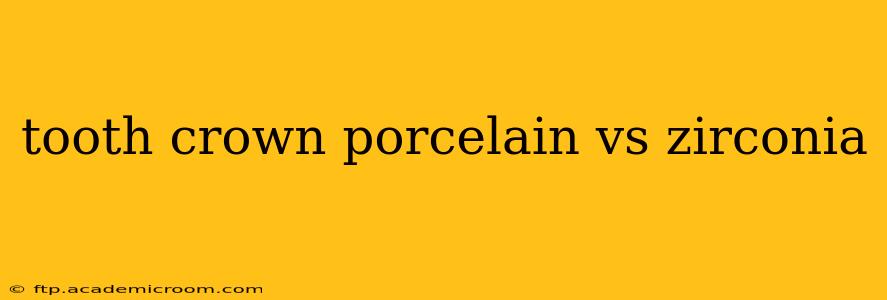Choosing between a porcelain and a zirconia crown can feel overwhelming. Both are popular options for restoring damaged teeth, offering excellent strength and aesthetics. However, there are key differences that impact their suitability for individual patients. This guide will break down the pros and cons of each, helping you make an informed decision in consultation with your dentist.
What is a Porcelain Crown?
Porcelain crowns are made from a ceramic material that's incredibly strong and lifelike in appearance. They're meticulously crafted to match the color and translucency of your natural teeth, resulting in a highly aesthetic restoration. Porcelain is known for its ability to mimic the natural light reflection of teeth, making it a popular choice for crowns in highly visible areas.
Advantages of Porcelain Crowns:
- Excellent Aesthetics: Porcelain crowns are renowned for their natural look and feel. They seamlessly blend with surrounding teeth.
- Biocompatible: Porcelain is generally well-tolerated by the body, minimizing the risk of allergic reactions.
- Strong and Durable: While not as strong as zirconia, porcelain crowns are durable enough for most teeth, particularly in areas with less stress.
Disadvantages of Porcelain Crowns:
- Less Durable Than Zirconia: Porcelain crowns are more susceptible to chipping or fracturing, especially in areas subjected to significant bite force (like molars).
- More Technique-Sensitive: The fabrication process is more demanding, requiring a higher level of skill from the dental technician.
- Can Stain Over Time: Although modern porcelain crowns are stain-resistant, they are still more prone to staining compared to zirconia.
What is a Zirconia Crown?
Zirconia crowns are made from a high-strength ceramic material known for its exceptional durability and strength. They're resistant to chipping and fracture, making them a long-lasting option for restoring damaged teeth. While not as aesthetically pleasing as porcelain in some cases, zirconia crowns are becoming increasingly lifelike in appearance with advancements in technology.
Advantages of Zirconia Crowns:
- Exceptional Strength and Durability: Zirconia crowns are significantly stronger and more resistant to chipping and fracturing than porcelain crowns, making them ideal for molars and other high-stress areas.
- Long-Lasting: Their superior durability translates to a longer lifespan compared to porcelain crowns.
- Stain Resistant: Zirconia is highly resistant to staining, maintaining its bright white appearance over time.
Disadvantages of Zirconia Crowns:
- Slightly Less Aesthetic: While improving, zirconia crowns can sometimes appear less natural in appearance than porcelain crowns, especially in cases where precise color matching is crucial. This is largely dependent on the skill of the technician and the type of zirconia used.
- Can Appear Opaque: Zirconia can sometimes appear slightly opaque, unlike the natural translucency of teeth. Newer techniques are addressing this limitation, however.
Porcelain vs. Zirconia: Which is Better?
The "better" option depends entirely on your individual needs and the specific circumstances of your case. Factors to consider include:
- Location of the Crown: For molars and other high-stress areas, zirconia's superior strength makes it a better choice. For front teeth where aesthetics are paramount, porcelain might be preferred.
- Bite Force: Patients with a strong bite force might benefit more from the durability of zirconia.
- Budget: Zirconia crowns can sometimes be slightly more expensive than porcelain crowns.
- Aesthetic Preferences: If a perfectly natural appearance is a top priority, porcelain might be the better option, though newer zirconia options are closing this gap.
What are the Different Types of Zirconia?
There are different types of zirconia, each with slightly different properties affecting aesthetics and strength. Your dentist can discuss the options available and which best suits your needs.
What are the Potential Complications of Each Type of Crown?
Potential complications for both types of crowns include: allergic reactions (though rare with porcelain and zirconia), chipping or fracture (more likely with porcelain), and gum irritation around the crown margin. Proper dental hygiene is crucial for preventing complications.
How Long Do Porcelain and Zirconia Crowns Last?
With proper care, both porcelain and zirconia crowns can last for many years, even decades. Zirconia crowns tend to have a longer lifespan due to their increased durability.
How Much Do Porcelain and Zirconia Crowns Cost?
The cost of both types of crowns varies depending on several factors, including the location of the crown, the complexity of the procedure, and your dentist's fees. It is best to consult with your dentist for an accurate estimate.
Ultimately, the best choice for you will be determined in consultation with your dentist. They will assess your oral health, consider the location of the required crown, and discuss your aesthetic preferences and budget to recommend the most suitable option. Remember to ask plenty of questions and ensure you fully understand the process and the implications of each choice.
